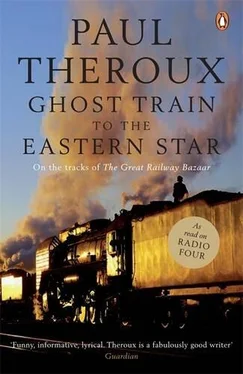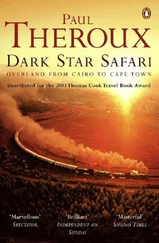"Little bits of uncompleted life" — what the traveler habitually sees — inspire pathos and poetry, as well as the maddening sense of being an outsider, jumping to conclusions and generalizing, inventing or recreating places from vagrant glimpses.
It was only twenty minutes from soot-crusted Waterloo to its opposite, the open farmland of Kent, many of the fields already raked by a harrow, plowed and awaiting planting in this first week of March.
"Will you be having wine with your lunch?"
A woman in a blue uniform brought me a bottle of Les Jamelles Chardonnay Vin de Pays d'Oc 2004, praised on the menu for its "subtle vanilla from the oak and a buttery finish."
And then the lunch tray: terrine de poulet et de broccolis, chutney de tomates, the entrée a fillet of lightly peppered salmon, with coup de chocolat for dessert. This was, superficially at least, a different world from the one I had seen on the Railway Bazaar, that long-ago trip to Folkestone, and then standing at the rail of the ferry, feeling guilty and confused, eating a cold pork pie.
The tunnel was a twenty-two-minute miracle, the ultimate rabbit hole, delivering me from my English memories, speeding me beneath the channel to France, where I had only superficial and spotty recollections, of pleasures and misunderstandings, of eating and drinking, of looking at pictures, or hearing oddities, like that of the young pretty French woman who said to me, "I am seeing tonight my fiancé's mistress. I seenk we will have sex. I love stupid women." And then she said, "You are smiling. You Americans!"
After the tunnel, rain falling from the French sky on the tiled roofs and the tiny cars driving on the right, but apart from that it could have been Kent: the same smooth hills and chalky plateau, and the same blight, the same warehouses, the low industrial outbuildings and workshops, the rows of bare poplars in the misty midafternoon.
It was such a swift train trip, and so near was France to England, that it was hard to think of it as a separate country, with its own food and its peculiar scandals and language and religion and dilemmas. Enraged Muslim youths setting cars on fire was one of the current problems; only one death but lots of blazing Renaults.
Why is the motorway culture drearier in Europe than anywhere in America? Perhaps because it is imitative and looks hackneyed and unstylish and ill fitting, the way no European looks quite right in a baseball cap. While the gas stations and industrial parks matched the disposable dreariness of American architecture, set against a French landscape they looked perverse, with Gothic spires and haywains and medieval chalets in the distance, like a violation of an old trust, the compact villages and plowed fields and meadows set off by ugly roads and crash barriers.
Because of what Freud called "the narcissism of minor differences," all these open fields, battlegrounds since ancient times, were the landscapes of contending armies, a gory example of civilization and its discontents. And so whatever else one could say, it was a fact that the route of this railway, once soaked in blood and thick with the graves of dead soldiers — millions of them — had been serene for the past half century, perhaps its longest period of peace.
We crossed a river with a tragic name. One day in July ninety years ago, where the soft rain fell on the lovely meadows and low hills, in sight of the distant spires of Amiens on one side of the train and the small town of Péronne on the other, the valley of this river, the Somme, had been an amphitheater of pure horror. On that first day of battle, 60,000 British soldiers were killed, plodding slowly because of the 66-pound packs on their backs. They advanced into German machine-gun fire, the largest number of soldiers killed on one day in British history. In the four months of this bloodbath, the first battle of the Somme, which ended in November 1916, more than one million soldiers were killed — British 420,000; French 194,000; German 440,000. And to no purpose. Nothing was gained, neither land nor any military advantage, nor even a lesson in the futility of war, for twenty-five years later — in my own lifetime — the same armies were at it again, warring in these same fields. All of them were colonial powers, which had annexed vast parts of Africa and Asia, to take their gold and diamonds, and lecture them on civilization.
The colors and clothes of the pedestrians on the streets nearer Paris reflected French colonial history — Africans, West Indians, Algerians, Vietnamese. They were kicking soccer balls in the rain. They were shoppers in the street markets, residents of the dreary tower blocks and tenements, the public housing at the edge of Paris that the Eurostar was passing and penetrating. We entered the city of mellow cheese-like stone and pitted façades and boulevards. London is largely a low city of single-family homes — terraces, cottages, townhouses, mews houses, bungalows, semi-detached villas. Paris is a city of rococo apartment buildings, bosomy with balconies, not a house to be seen.
With my small bag and a briefcase I looked such a lightweight that the porters at the Gare du Nord ignored me. I passed through the station to the front entrance, in the floodlit glow of the lovely façade with its classical-looking statues representing the cities and larger towns of France. They were sculpted in the early 1860s by (so a sign said) "the greatest names in the Second Empire."
The streets were thick with unmoving cars and loud honking and angry voices. I asked a smiling man what the problem was.
" Un manifestation " he said.
"Why today?"
He shrugged. "Because it's Tuesday."
Every Tuesday there was a large, riotous demonstration in Paris. But for its size and its disruption this one was to be known as Black Tuesday.
A NATIONAL CRISIS is an opportunity, a gift to the traveler; nothing is more revealing of a place to a stranger than trouble. Even if the crisis is incomprehensible, as it usually is, it lends drama to the day and transforms the traveler into an eyewitness. Purgatorial as a crisis sometimes is for a traveler, it is preferable to public holidays, which are hell: no one working, shops and schools closed, natives eating ice cream, public transport jammed, and the stranger's sense of being excluded from the merriment — from everything. A holiday is an occasion for utter alienation; a crisis can be spectacle, seizing the stranger's attention.
The reason Paris has the luminous quality of being a stage set is that it was redesigned with that theatrical aim in mind, around 1857, by Georges Haussmann (hired by Louis Napoleon, calling himself emperor), who destroyed its houses and slums in mass evictions, flattened its alleyways and lanes, and gave it wide boulevards, soaring mansion blocks, monuments and fountains, and the big-city conceit of seeming to be at the center of the world. The city was remade in a single style.
Paris's ornate backdrop of beautiful biscuit-colored buildings and extravagant arches and obelisks — the imperial city, complete with floodlights — is so fixed in people's minds, especially people who've never seen it, that describing it is irrelevant. And anyway, who bothers? In the fiction of Paris, it is enough for the writer to state the name of a boulevard or a district. Take Simenon. I happened to be reading his novels, for their portability and their oddness. "He returned to Rue des Feuillantines by a long detour in order to go to Montsouris Park" — no more than that; the place is taken for granted, as fixed as a picture on a calendar. The mention of evocative names is description enough. Nothing to discover, nothing to show; the city looms, but instead of feeling dwarfed, the big-city dweller feels important.
Читать дальше












